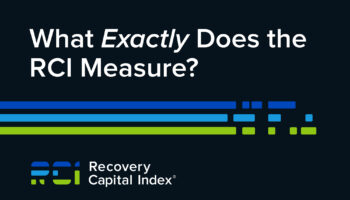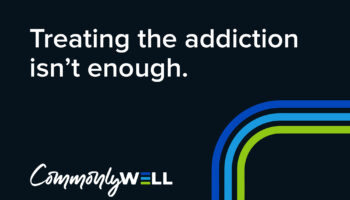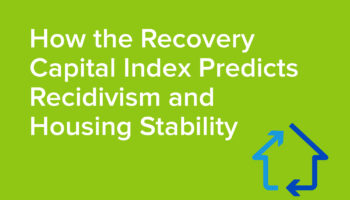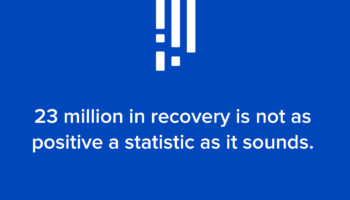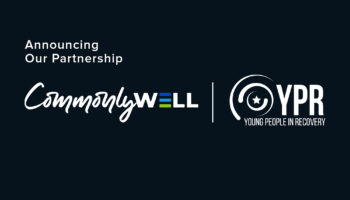Insights & Resources
Data Ownership and Privacy
Your healthcare data might be about you, but it’s not yours – not really. Current regulations seem to protect your data. Despite the appearance of strong privacy regulations, there’s a lot of grey area and rampant misuse. Yes, let’s fix the laws, but we need higher ethical standards and principles for data capture and use.
Read More →By David
5/31/23
The Recovery Capital Index: A Validated Assessment
The Recovery Capital Index (RCI) measures what it says it measures: addiction wellness. Developed at Face it TOGETHER (FIT) by David Whitesock (now CEO & Founder of Commonly Well), the RCI is built on three domains, nine indicators, and 22 components which have been proven to positively affect recovery and provide a comprehensive assessment of intervention effectiveness.It also focuses on longitudinal health outcomes, giving therapists and peer coaches insights into an individual’s progress, growth, and well-being over time.
Read More →By David
3/28/23
Beyond Treating the Addiction
When only 10-20% of our health can be attributed to clinical care, it’s time to go beyond just treating the addiction. A whole-person addiction care approach includes assessing and addressing a person’s recovery capital to improve outcomes. Treatment alone does not produce the health outcomes we expect. It is incomplete. The above statistic is a call to treat beyond the addiction itself. In the addiction recovery field, it’s a call to address a person’s recovery capital.
Read More →By Patrick
3/21/23
How the Recovery Capital Index Predicts Recidivism and Housing Stability
The Recovery Capital Index, by design, does not predict sobriety, but it can supply indications of return to use. When the data comes together with an individual’s story, we can design effective interventions based on that predictiveness. The number one question we get asked about the Recovery Capital Index (RCI) is, “Does it predict sobriety?”Answer: No. But it can supply indications of a problematic return to use or other behaviors.We understand why this is the question so many ask. It has everything to do with the traditional view of addiction; that recovery from addiction is synonymous with abstinence. Clinical care and society have long measured success as prolonged abstinence. So, it makes sense that most wonder about whether the RCI predicts sobriety.
Read More →By David
3/7/23
Normalizing Failure
In the addiction and recovery field, we seldom talk about whether what we do works. When half of the people served go through treatment five or more times before it sticks, we say it’s time to rethink the approach.The statistic is sobering. Today, the average number of times someone with a drug or alcohol addiction goes through treatment is four. In other words, it takes five or more multi-week treatments for a person to overcome their addiction.Failure has been normalized.
Read More →By Patrick
3/2/23
The Three Domains of a Resilient Life
To move beyond sobriety as the only measure of recovery success, we must shine a spotlight on the social determinants of health. The Recovery Capital Index (RCI) achieves this by respecting the entire presence and experience of a person.
Read More →By Patrick
2/28/23
23 Million in Recovery: Not As Positive As It Sounds
Addiction and recovery advocates, for the last decade, have used 23 million people in recovery as their primary statistic to combat stigma and raise funds. Digging into the data, however, provides a more powerful narrative that recovery leaders and advocates need to know and use.
Read More →By David
2/24/23
Using Data to Enhance the Journey of Recovery: A Conversation with Young People in Recovery
Commonly Well, the nation’s first recovery intelligence consultancy, has partnered with Young People in Recovery to achieve a comprehensive measure of the substance use recovery journey at an individual, community, and national level. Young People in Recovery (YPR), a national organization that provides life skills and peer support to help people recover from substance use disorder, will use Commonly Well’s Recovery Capital Index (RCI) tool to quantify the effectiveness of its programs. YPR will implement the RCI throughout its network of 56 chapters across 17 states over a two- year period.
Read More →By David
2/15/23
Role of loss aversion in addiction recovery
Loss aversion is a strong behavioral and psychological bias that needs more attention and application in addiction careThe reason we need to incorporate more psychology and behavioral science into our care models is simple …The time to recover from addiction is unnecessarily long and difficult.
Read More →By David
11/30/22
On the origins of recovery capital
Despite popular depictions and tropes of people struggling with addiction, most people overcome alcohol and drug dependencies without the aid of formal treatment.How is this possible?How does someone suffering a “disease” get well without clinical care?That was the question Robert Granfield and William Cloud explored and set out to answer in the late 90s. This understanding could focus social, political, and clinical solutions across the spectrum of addiction and dependency experiences.Recovery capital was the term they coined to encapsulate the physical, social, and human resources that individuals draw upon to naturally recover.
Read More →By David
10/21/22
On celebrating good decisions
When you are heads down working toward a goal, have you ever gotten a small win or made a change in life and never thought twice of it? You just took it for granted and continued one.This happens all the time and to all of us. But this is actually a bad habit.
Read More →By David
10/9/22
Measuring beyond sobriety
A person you love seems to care about nothing of importance in their life. They disappear for days, weeks, maybe even months or years. At first, this person’s relationship to alcohol or drugs was no different than anyone else’s. But slowly then all at once, chaos. Addiction takes hold. It’s a vortex. Everyone gets sucked in.
Read More →By David
10/4/22

